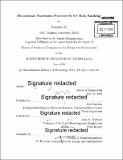| dc.contributor.advisor | Abel Sanchez and John R. Williams. | en_US |
| dc.contributor.author | Li, Rongsha | en_US |
| dc.contributor.other | Massachusetts Institute of Technology. Computation for Design and Optimization Program. | en_US |
| dc.date.accessioned | 2017-02-16T16:43:57Z | |
| dc.date.available | 2017-02-16T16:43:57Z | |
| dc.date.copyright | 2015 | en_US |
| dc.date.issued | 2015 | en_US |
| dc.identifier.uri | http://hdl.handle.net/1721.1/106961 | |
| dc.description | Thesis: S.M., Massachusetts Institute of Technology, School of Engineering, Center for Computational Engineering, Computation for Design and Optimization Program, 2015. | en_US |
| dc.description | Cataloged from PDF version of thesis. | en_US |
| dc.description | Includes bibliographical references (pages 75-76). | en_US |
| dc.description.abstract | Today, organizations are generating large volumes of data. However, the challenge of extracting valuable information from the data has been a large and long-standing problem. Here, we address the problem of quantifying risks and detecting fraud in heterogeneous financial big data. Great financial losses are pressuring institutions to devise innovative solutions for risk and fraud detection. Current approaches in government suffer from issues such as high false positive rates and low adaptability to the continuous evolution of newer fraud. In this thesis, we propose an open and extensible framework called "Situational Awarness FrAamework for RIsk ranking" (SAFARI). SAFARI aims to quantify and rank risk with unlabeled, complex data in the financial world. The framework integrates and analyzes different perspectives of financial data, and extends risk scores for decision makers. SAFARI also utilizes machine learning techniques to learn from examined cases to improve the calculation of risks and adapt to the changing behavior of fraudulent activities. The work includes designing, implementing, testing, extending and evaluating the proposed framework. In the overpayment detection scenario, results show SAFARI can effectively find overpayments with low false positive rates. Furthermore, SAFARI can be extended to assist decision making in a variety of environment thanks to its general applicability. | en_US |
| dc.description.statementofresponsibility | by Rongsha Li. | en_US |
| dc.format.extent | 76 pages | en_US |
| dc.language.iso | eng | en_US |
| dc.publisher | Massachusetts Institute of Technology | en_US |
| dc.rights | MIT theses are protected by copyright. They may be viewed, downloaded, or printed from this source but further reproduction or distribution in any format is prohibited without written permission. | en_US |
| dc.rights.uri | http://dspace.mit.edu/handle/1721.1/7582 | en_US |
| dc.subject | Computation for Design and Optimization Program. | en_US |
| dc.title | Situational awareness framework for risk ranking | en_US |
| dc.type | Thesis | en_US |
| dc.description.degree | S.M. | en_US |
| dc.contributor.department | Massachusetts Institute of Technology. Computation for Design and Optimization Program | |
| dc.identifier.oclc | 936569210 | en_US |
